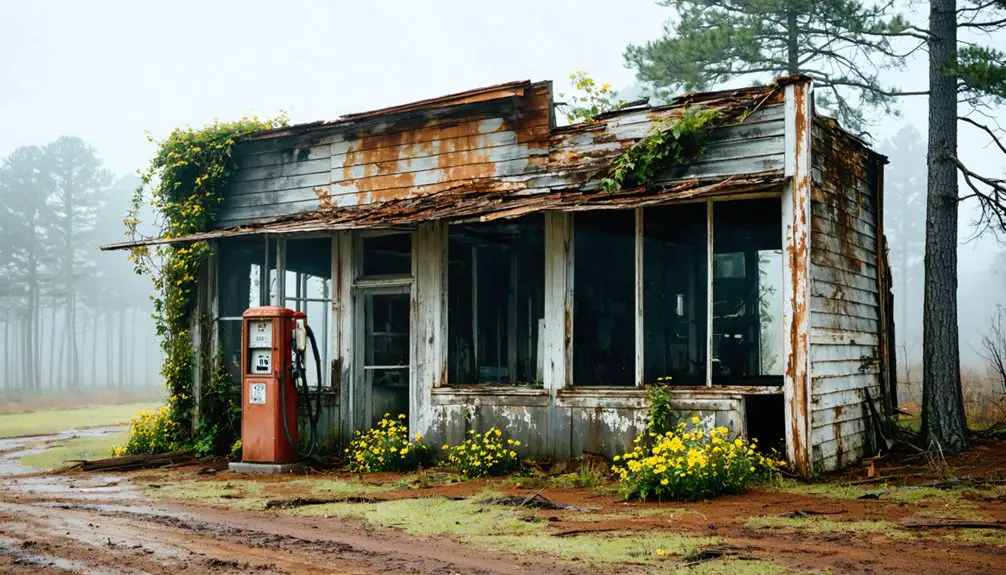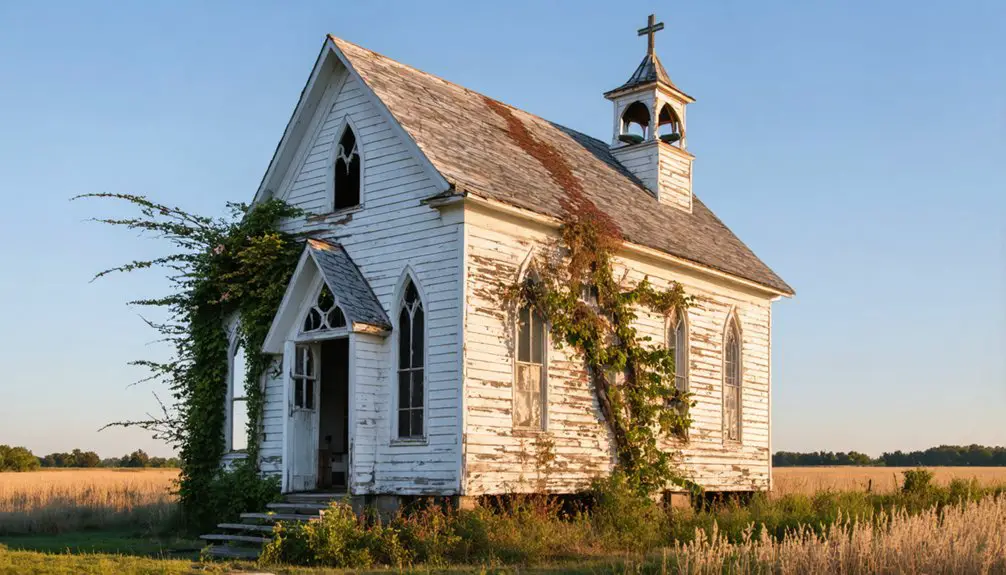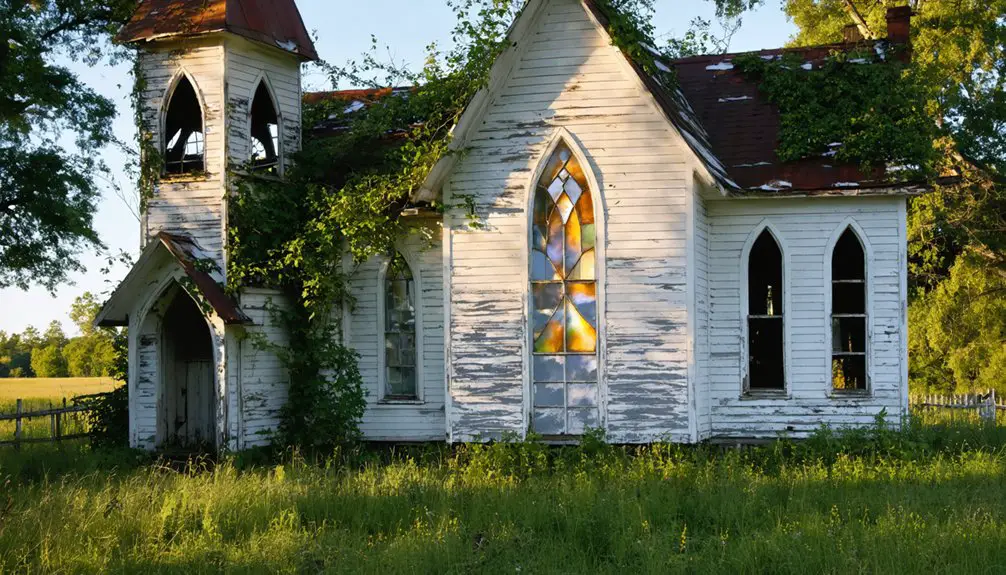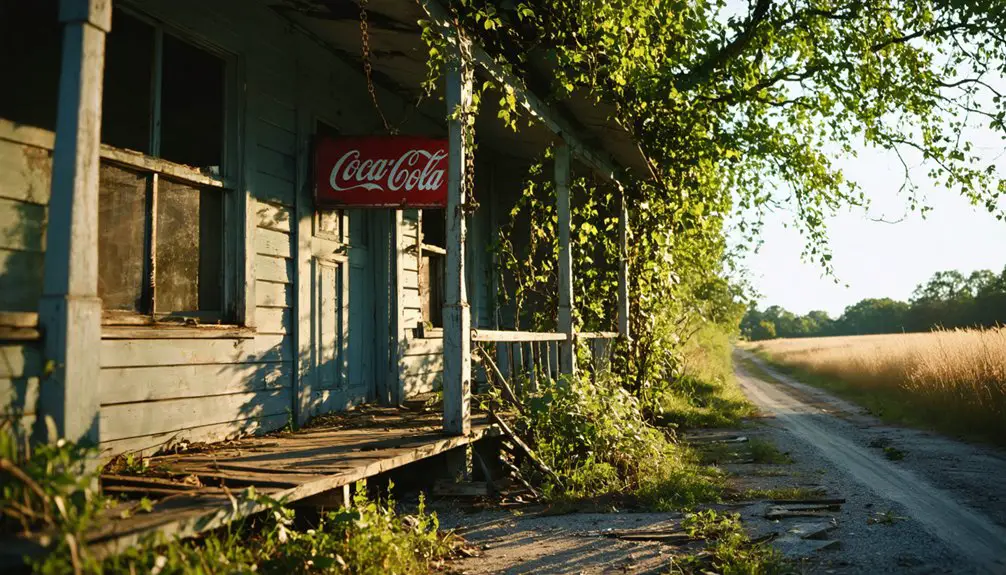You’ll discover the haunting remnants of Brewton, a once-thriving Mississippi lumber town that served as Jackson County’s seat from 1816 to 1826. Located along the Pascagoula River at 30°38’N, 88°39’W, this ghost town flourished during the Southern yellow pine boom but fell victim to devastating fires, Indian attacks, and economic hardship. The town’s remaining courthouse basement and rich folklore tell a fascinating tale of prosperity, turmoil, and ultimate abandonment in the dense Mississippi forests.
Key Takeaways
- Brewton was Jackson County’s second county seat from 1816 to 1826 before being abandoned due to accessibility issues.
- Multiple devastating fires destroyed the town’s critical infrastructure, including the sawmill and courthouse.
- The depletion of virgin pine forests and decline of the lumber industry contributed significantly to Brewton’s abandonment.
- Only the courthouse basement remains as physical evidence of the former settlement near the Pascagoula River.
- The town’s isolation, combined with Indian attacks and gang activity, made it increasingly difficult for settlers to maintain residence.
The Rise and Fall of a County Seat
While Brewer’s Bluff became Jackson County’s first county seat in 1816, its initial designation proved short-lived due to impractical location concerns.
You’ll find evidence of the administrative challenges in the early construction of a courthouse and jail, which couldn’t overcome the site’s fundamental accessibility issues.
Unlike the successful town of Brewton in Alabama, which became established as a thriving county seat in 1883, Brewer’s Bluff failed to maintain its administrative role.
The town’s decline led it to become part of the Mississippi Gulf Coast region’s historical legacy.
Lumber Industry’s Golden Age
As southern yellow pine became the lumber industry’s most coveted resource, Brewton’s golden age of timber emerged in the early 20th century.
You’d find lumber innovations transforming the industry, as steam-powered mills replaced water wheels and efficient band saws took over from circular blades. The T.R. Miller Mill led this evolution, surviving while 27 other local sawmills failed. By 1913, the company employed over 800 people at its expanding operations.
Steam power and band saws revolutionized Brewton’s lumber industry, with T.R. Miller Mill emerging as the sole survivor among its competitors.
Timber transportation evolved dramatically during this period. While early operations relied on creek floating and ox-drawn skidders, railroads revolutionized log hauling from 1905 to 1940.
You could witness massive timber rafts being piloted down to Pensacola Bay, where European markets enthusiastically awaited shipments. Unlike northern companies that clear-cut and abandoned local forests, Brewton’s family-owned operations, like T.R. Miller Mill, sustained their timber holdings through careful management. Today, the company maintains its environmental responsibility with strong replanting practices to ensure forest sustainability.
Turmoil, Fire, and Abandonment
The promising era of Brewton’s lumber industry came to an abrupt end through a series of devastating setbacks.
You’ll find that despite the community’s resilience, multiple fires ravaged critical infrastructure, including the sawmill burning down twice and the courthouse’s destruction by James Copeland’s gang.
As the county seat in 1816, Brewton initially showed great promise for growth and development.
The town’s isolation near the Pascagoula River, while initially strategic, proved problematic during times of economic hardship.
Indian attacks made travel to areas east of the Pascagoula River extremely dangerous for settlers.
The depletion of virgin pine forests dealt the final blow to Brewton’s survival.
You can trace the town’s decline through its desperate attempts at revival, including multiple name changes from Brewer’s Bluff to Klondike.
Today, only the courthouse basement remains as evidence of this once-thriving lumber town, now counted among Mississippi’s historic ghost towns.
Natural Landmarks and Geographic Features
Located on Brewer’s Bluff at approximately 30°38’N latitude and 88°39’W longitude, Brewton’s strategic position rises 135 feet above the Pascagoula River‘s west bank.
You’ll find this elevated terrain offered natural advantages for early settlers, providing both defensive capabilities and clear views of the surrounding wilderness.
The town’s river proximity shaped its development, with the Pascagoula serving as an essential transportation route. Modern GPS devices can pinpoint these locations using UTM coordinates for precise navigation.
You can imagine the dense pine forests that once surrounded the settlement – these natural landmarks were significant to Brewton’s early lumber industry.
The landscape featured a mix of hardwood and coniferous trees typical of coastal Mississippi, though extensive logging eventually depleted these resources.
Today, nature has reclaimed most of the area, with only courthouse foundation remnants marking where this once-thriving town stood.
Local Legends and Historical Legacy
While serving as Jackson County’s second county seat from 1816 to 1826, Brewton gained notoriety through dramatic events that would shape its historical legacy.
The town’s history intertwines with outlaw folklore, particularly surrounding the mysterious burning of its courthouse – an act attributed to either James Copeland or James Outland.
Today, you’ll find ghost stories centered around these dramatic events and the town’s eventual downfall.
- The courthouse’s remaining basement serves as a haunting reminder of the town’s tumultuous past
- Local tales speak of a “curse” following multiple devastating fires and economic failures
- Native American conflicts created an atmosphere of danger that plagued early settlers
- The town’s multiple name changes (Brewer’s Bluff, Rice Bluff, Klondike) reflect its unstable history
The town was once a bustling community with stores and a hotel, reflecting its brief period of prosperity before decline.
Frequently Asked Questions
Are There Any Archaeological Excavations Currently Taking Place at Brewton’s Site?
You won’t find any active archaeological techniques or excavation methods underway at this location, as current records and professional archaeological associations don’t document any ongoing fieldwork at the site.
What Happened to the Residents Who Left Brewton After Its Decline?
Studies show 100% of residents departed, with migration patterns leading them to nearby towns, agricultural work, and urban centers along the Pascagoula River. You’ll find their stories woven into surrounding communities today.
Can Visitors Legally Explore the Remaining Courthouse Basement Ruins Today?
You can’t legally explore the courthouse ruins without explicit landowner permission since there’s no official public access, and the site’s location on private property makes unauthorized exploration subject to trespassing laws.
Were There Any Notable Native American Settlements in Brewton Before Colonization?
You won’t find direct evidence of specific Native tribes at this location, though settlement history suggests Mississippian culture groups likely moved through the area before colonization, based on regional archaeological patterns.
What Modern-Day Towns or Communities Are Closest to Old Brewton’s Location?
Within 5 miles of Brewton’s historic site, you’ll find Vancleave, Hurley, and Moss Point as the nearest populated communities, with Pascagoula River Road serving as your main access to these landmarks.
References
- https://raregoldnuggets.com/?p=3890
- https://www.treasurenet.com/threads/brewton-ghost-town.96121/
- https://www.onlyinyourstate.com/experiences/mississippi/ms-ghost-towns
- https://www.thetravel.com/mississippi-ghost-towns-worthy-of-a-road-trip/
- https://mississippifolklife.org/articles/haunted-by-a-ghost-town-the-lure-of-rodney-mississippi
- https://www.loquis.com/en/loquis/6615372/Brewton+Mississippi
- https://www.troy.edu/libraries/wade-hall-postcards/traveling-exhibit/historical-streets/southwest-alabama-streets-traveling-exhibit.html
- https://www.familysearch.org/en/wiki/Escambia_County
- https://en.wikipedia.org/wiki/Brewton
- http://genealogytrails.com/miss/jackson/towns_descriptions.html



